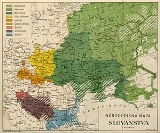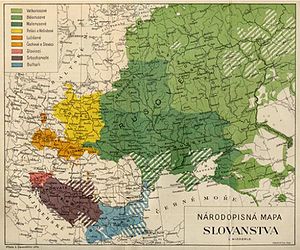
Lubor Niederle
Encyclopedia

Czech lands
Czech lands is an auxiliary term used mainly to describe the combination of Bohemia, Moravia and Czech Silesia. Today, those three historic provinces compose the Czech Republic. The Czech lands had been settled by the Celts , then later by various Germanic tribes until the beginning of 7th...
.
During 1883-87 Niederle had studied at the Charles University in Prague
Charles University in Prague
Charles University in Prague is the oldest and largest university in the Czech Republic. Founded in 1348, it was the first university in Central Europe and is also considered the earliest German university...
. He was initially interested in classical archaeology, then studied anthropology, sociology and ethnology. Later, he studied in Munich
Munich
Munich The city's motto is "" . Before 2006, it was "Weltstadt mit Herz" . Its native name, , is derived from the Old High German Munichen, meaning "by the monks' place". The city's name derives from the monks of the Benedictine order who founded the city; hence the monk depicted on the city's coat...
under professor Johannes Rank (1889) and in Paris
Paris
Paris is the capital and largest city in France, situated on the river Seine, in northern France, at the heart of the Île-de-France region...
under professor Léonce Manouvriere at the École d’anthropologie. Niederle also travelled in several Slavic countries, studying archaeological findings and historical documents.
In 1898 Niederle was named professor at the Charles University. As archaeologist he had represented the "university school" (univerzitní škola), opposed to the "museum school" (muzejní škola) represented by archaeologist Josef Ladislav Píč
Josef Ladislav Píc
Josef Ladislav Píč was Czech archaeologist and paleontologist, one of founders of modern Czech archaeology....
.
During 1907-08 Niederle served as a dean
Dean (education)
In academic administration, a dean is a person with significant authority over a specific academic unit, or over a specific area of concern, or both...
of Faculty of Philosophy, during 1908-09 as a vice-dean and during 1927-28 as a rector of the faculty. In 1919 he helped to establish State Archaeological Institute (Státní archeologický ústav), today's Institute of Archaeology (Archeologický ústav) . He also published many articles about Slavic ethnography and archaeology and was editor of several specialised journals. Niederle had helped to set up Slavic Institute (Slovanský ústav) in Prague whose director he was during 1928-31.
Among most known works are "Handbook of Czech Archaeology" (Rukověť české archeologie, 1910, with Karel Buchtela) and mainly the eleven volume series "Slavic Antiquities" (Slovanské starožitnosti) published between 1902-34. This series had exhaustively investigated origin and prehistory of the Slavs, continuing earlier work by historian Pavel Josef Šafařík.

